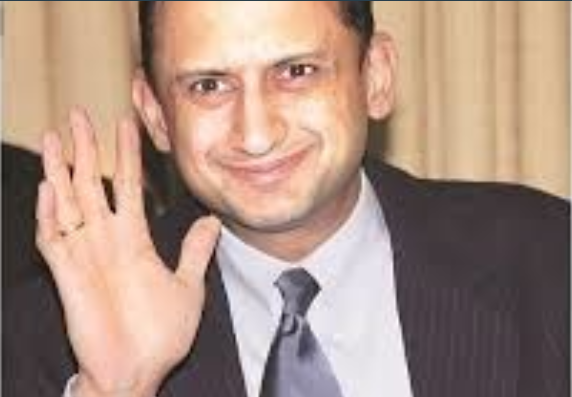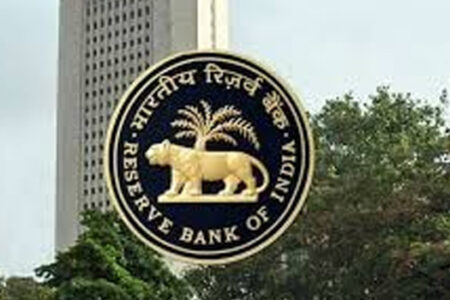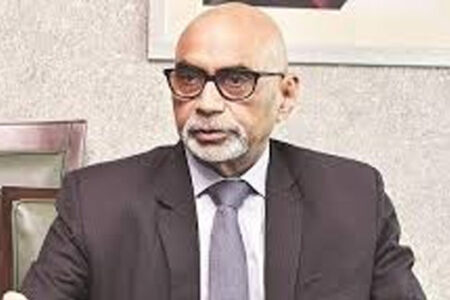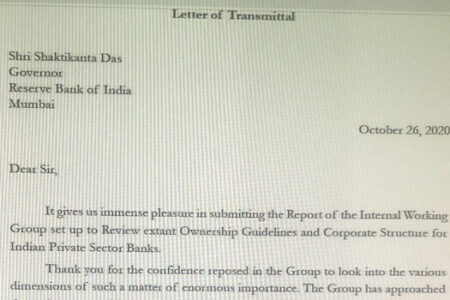Viral Acharya, Reserve Bank of India’s youngest deputy governor post economic liberalisation, has resigned six months before the scheduled end of his term. Acharya who joined the RBI on January 23, 2017 for a three-year term, is returning to New York University Stern School of Business (NYU Stern) in August instead of February 2020 as the CV Starr professor of economics.
People familiar with the development said he had put in his papers a few weeks before the last meeting of the RBI’s rate-setting panel Monetary Policy Committee (MPC) early this month. His last day at office will be a few days before the end of July.
Acharya confirmed his departure from the RBI due to “unavoidable personal reasons”. Pressed for further comments, he said, “A school teacher once told me `When your work speaks for itself, do not interrupt’.”
In a parallel development, the senior most deputy governor N. Vishwanathan, whose term is due to end in the first week of July, is likely to stay back for another term, as RBI Governor Shaktikanta Das is reportedly in favour of stability at the top in the central bank. Das has been at the helm for less than seven months, and at this juncture, having two new deputy governors at the same time may not be an ideal situation.
The exercise for identifying Vishwanathan’s successor had already begun, but the process is being put on hold. “That Vishwanathan will remain in office is almost certain – it could be for one or two years,” says a person in Delhi, familiar with the developments.
Acharya not staying back for his full term has been a constant topic of discussion in banking circles after Urjit Patel resigned as governor in December 10 last year. A statement on the central bank’s website on that day attributed “personal reasons” to Patel’s move. He had assumed charge as the 24th governor for three years after Raghuram Rajan’s term ended in September 2016.
Under the RBI Act, the central bank can have up to four deputy governors. While one post is meant for a commercial banker (currently M.K. Jain, former IDBI Bank chief, is holding that post), among the other three, one is typically an economist.
Though the “economist” deputy governor does not necessarily need to be an outsider, by convention, the past few deputy governors in charge of monetary policy have come from outside. Patel held that position before Acharya. Patel’s predecessors were Subir Gokarn, Rakesh Mohan and Y.V. Reddy. Before Reddy, an insider, S.S. Tarapore, was the deputy governor in charge of monetary policy.
It is not known as yet who will succeed Acharya. The two names doing the rounds are Sanjeev Sanyal, principal economic advisor in the ministry of finance, and Michael Patra, executive director of the RBI and a member of the MPC.
The last deputy governor to leave before the end of his term was Rakesh Mohan. He moved to Stanford University in May 2009, a year before his tenure was due to end. Mohan, considered a frontrunner to succeed Reddy as RBI governor, lost out to then finance secretary D. Subbarao who took over just a week before the collapse of US investment bank Lehman Brothers.
The context of Acharya’s decision to quit is different. Along with Patel, he had put up a stiff fight for the RBI’s independence when tension was building up between the government and the banking regulator.
Acharya had warned of the “potentially catastrophic” consequences of interference on the government’s part. “Governments that do not respect central bank independence will sooner or later incur the wrath of financial markets, ignite (an) economic fire, and come to rue the day they undermined an important regulatory institution,” Acharya had said in the last week of October while delivering the A.D. Shroff Memorial Lecture in Mumbai.
An evidence of the fast deteriorating relationship between the government and the central bank came days after Acharya delivered the speech, when Subhash Chandra Garg, then economic affairs secretary and a member of the central bank board, tweeted: “Rupee trading at less than 73 to a dollar, Brent crude below $73 a barrel, markets up by over 4% during the week and bond yields below 7.8%. Wrath of the markets?”
In another speech given at his alma mater, the Indian Institute of Technology, Bombay, Acharya had strongly defended the so-called prompt corrective action (PCA) on weak banks. Without the PCA, Acharya had argued, some banks would have incurred even higher losses and would have required even more of taxpayer money for recapitalisation. The PCA,among other things, restrains weak banks from giving fresh loans.
The PCA is one of the several areas on which the central bank, headed by Patel, and the government did not see eye to eye. There were other issues such as how much capital and reserves should the RBI have on its balance sheet and how much it can pass on to the government, and infusion of liquidity to the stressed non-banking financial companies, among others. The RBI’s “dissent” on the recommendations of a government panel on changes to payment and settlement laws is also in the public domain.
Things came to such a pass that the government threatened to exercise its power under Section 7 of the RBI Act that empowers the central bank’s board to direct it in business affairs. As a result, the normally routine board meetings turned long and acrimonious.
There is nothing new in the rift between the RBI and the government but the scale that it had reached was unprecedented. It led to Patel’s exit in December and Acharya’s now. Das, the new governor, in no believer in conflict; consultative process is his wont.
Acharya has been a different kind of central banker. He doesn’t go to office wearing a suit and tie unless there is a formal meeting; he doesn’t stay at the house reserved for a deputy governor in south Mumbai’s tony Napean Sea Road, living instead with his parents and brother’s family in the western suburb of Vile Parle; and often takes a shower in office. He plays tennis on the lawns of Ashoka Towers at Parel or the Bombay Gymkhana, and football with the neighbourhood children when his 11-year-old US-based son is in town.
Often referred to as the “poor man’s Rajan”, Acharya had started an Indian film music band while studying at NYU Stern in 1998—calling it Surbaheaar, after the music event at IIT Bombay.
As a deputy governor, his mandate is monetary policy-making but his core focus was primarily on the banking crisis and cleaning up the system till the exit of Patel. In an interview with this writer in June 2017, he was asked given a choice, would he stay on beyond three years, and his answer was: “At the moment, I look at this as a three-year assignment. That’s the understanding I have with my wife, who will remain in New York with my son. I am not thinking beyond this.”
Things have however turned out to be different.
In the last minutes of MPC, Acharya’s swan song, he wrote: “Why do old men wake so early? Is it to have one longer day?” wonders Santiago, the old fisherman, in “Old Man and the Sea” by Ernest Hemingway. I found myself preparing and writing these minutes early too, perhaps so I could have one longer drafting day!



